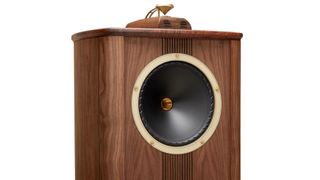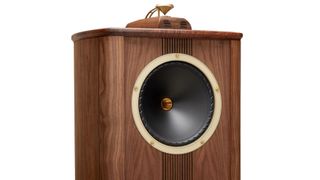Fyne Audio was one of many hi-fi exhibitors at this year’s High End Show in Munich, but the Glasgow UK-based firm’s otherworldly SuperTrax super tweeter deserves a special piece all of its own. First teased at the Bristol HiFi Show in February (see also the January-issue special production floorstanders and the Fyne Vintage X we saw in Bristol Hi-Fi Show 2024), Fyne Audio has now launched its SuperTrax tweeters to the public, along with the new SuperTrax SC1 cable – which you’ll want to use to hook it up to your regular speakers.
Even a quick glance at the new SuperTrax tweeter proves Fyne’s happy to stray a long, long way from the AMT or single-direction, forward-firing silk-dome options you’ll find in most traditional sets of speakers. It may look like Cobb’s totem, in Christopher Nolan’s epic Inception movie, but it really is a dedicated “super tweeter” unit.
The approach is an omnidirectional one, using an upward firing tweeter and a 360-degree “dispersion cone with tractrix profile”, promising a high-frequency performance up to 60kHz. And that quoted frequency response is several octaves above anything humans can actually hear; a figure you won’t find in even the best stereo speakers. Why bother with a tweeter that can go this high? Crispness through the leading edges of notes is one reason; feeling the breadth of your music’s dynamic nuance is another.
In addition to its otherworldly SuperTrax tweeter, Fyne is launching a new Vintage Classic Gold SP (Special Production) series, effectively bridging the gap between the company’s mid-range Vintage Classic Series loudspeakers and the flagship, high-end Vintage Series. And this aspirational tweeter unit will make a great addition to either of them; or in fact, any set of stereo speakers you own, up to 98dB/W sensitivity (with a +/-3dB control for balancing with the main speaker).
SuperTrax is available in two different color schemes to match the aesthetic of Fyne’s existing speaker series. The SuperTrax in Walnut sports gold metalwork that replicates the look of Fyne’s Vintage Classic Series and is available now for $4,599.99/ £3,499.99 per pair (which is around AU$6,649). Alternatively, the SuperTrax in Gloss Black with silver detail would look mighty Fyne (sorry) atop the F700 Series, and is also available now, at $ 3,999.99/ £2,999,99 per pair – so roughly AU$5,699 (but this last price is an approximation and thus, unofficial). Oh, and the SC1 cables are an additional $449.99 / £399.99.
As for the Vintage Classic Gold SP speaker series, it’s set for an Autumn 2024 release with prices still to be confirmed, but Fyne tells us they’ll sit nicely between the Vintage Classic and Vintage ranges for pricing.
If you’re augmenting the bass, why not the tweeter?

For us, Fyne’s upward-firing “super tweeter” technology is one of the most interesting reveals at High End Munich. While we didn’t get the chance to hear what it can do ourselves, there’s no doubt that this approach to refining those high notes via omnidirectional sound projection is intriguing. And the fact that Fyne says it can be used with any stereo speakers up to 98dB/W makes it an even more impressive feat of engineering.
We recently heard Magico’s $560,000 M7 speakers at a listening session during which founder Alon Wolf told us: “The tweeter should always be ear-level. Actually, 20% of the audio we hear is on-axis, 80% is off-axis; it’s how we know where we are. Everything else in our speaker design can be moved, the tweeter stays there.”
Now, here is a dedicated tweeter unit that its makers say can be placed on top of the speakers you currently own and do a superior job. But don’t get us wrong; Fyne has an enviable reputation in hi-fi circles and we truly want to hear what this dedicated (and quite expensive) tweeter unit can do. After all, it’s able to reach the hearing perception of dogs and cats, which compared to the 20kHz frequencies a human ear can hear is… something else.
On paper, those frequencies might seem excessive. Audiophiles would counter that when a speaker packs this much of a performance, your music becomes more of a physical sensation rather than a simple listening experience. After all, humans regularly augment bass frequencies in our hi-fi and home theater systems with a thumping, rumbling subwoofer. In case it needs to be reiterated (see Sonic Lamb’s headphones for more on this) humans don’t just hear through our ears; we also feel sound through our body. Admittedly, human hearing is tuned to higher frequencies (a twig snapping in the woods, cries of babies) and is far less sensitive to low (bass) frequencies (think thunder, rumbles in movie theaters) but the concept of feeling sound rather than hearing it is not new.
If we’re extending the bass registers with dedicated separates, why not extend the top end too, provided you’ve got the not-insignificant cash to splash?
You may also like
Services Marketplace – Listings, Bookings & Reviews
